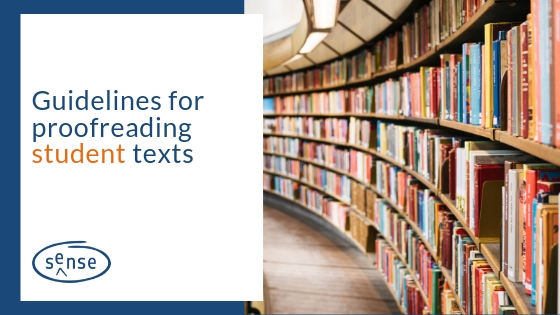Guidelines for Proofreading Student Texts
SENSE has prepared its own Guidelines for Proofreading[1] Student Texts and a Form to Confirm Proofreading Services. These can be downloaded free of charge.
• SENSE Guidelines for Proofreading Student Texts (pdf download here (582 KB) (662 KB))
• SENSE Form to Confirm Proofreading Services (document download here (43 KB) (43 KB))
The guidelines and form were compiled to help SENSE members carry out and formalize assignments. The guidelines apply to a range of student texts written in English, including single-author, monograph-style theses (i.e. Bachelor and Master theses, plus certain doctoral theses). They do not cover assignments to edit papers that are to be submitted to a scientific or academic journal, nor such papers included in a compilation doctoral thesis.
The form may be adapted for your own use, but please keep the SENSE logo on it and acknowledge the original source.
Comments and suggestions are welcome, via info@sense-online.nl. We would particularly welcome suggestions on how to acknowledge and clarify the language professional’s contribution to students’ work that will be assessed as part of their degree or diploma qualification.
[1] Proofreading here also means editing, as used by the University of Essex (UK). This term is explained in the Guidelines.
 SENSE has prepared its own Guidelines for Proofreading[1] Student Texts and a Form to Confirm Proofreading Services. These can be downloaded free of charge.
SENSE has prepared its own Guidelines for Proofreading[1] Student Texts and a Form to Confirm Proofreading Services. These can be downloaded free of charge.
pdf SENSE Guidelines for Student Texts (582 KB)
document SENSE Form to Confirm Proofreading Services (43 KB)
The guidelines and form were compiled to help SENSE members carry out and formalize assignments. The guidelines apply to a range of student texts written in English, including single-author, monograph-style theses (i.e. Bachelor and Master theses, plus certain doctoral theses). They do not cover assignments to edit papers that are to be submitted to a scientific or academic journal, nor such papers included in a compilation doctoral thesis.
The form may be adapted for your own use, but please keep the SENSE logo on it and acknowledge the original source.
Comments and suggestions are welcome; you can contact us via the following form. We would particularly welcome suggestions on how to acknowledge and clarify the language professional’s contribution to students’ work that will be assessed as part of their degree or diploma qualification.